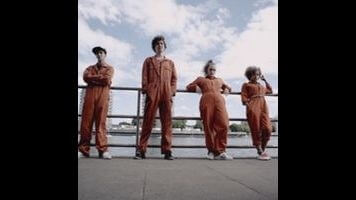Misfits: “Series Three, Episode Seven”

This episode of Misfits offers an interesting example of how preconceptions can alter an episode. Having seen the “next time on Misfits” and, or comments on how a zombie episode was coming up, I knew what to expect. So there wasn’t much of a surprise here, although I did admire the way it was put together. I do have to wonder how someone who wasn’t aware that it was going to be a zombie episode would have perceived the slow rising tension of the first twenty minutes or so. Maybe it was obvious regardless.
What Misfits did best to keep the tension slowly building was to keep the action small-scale. Part of that is budget, of course, but those constraints work seamlessly with the plot. This isn’t a total zombie apocalypse, it’s the start of one, which the misfits have to work to prevent. It’s one cat, one old woman, Seth’s dead girlfriend, a neighbor, a squad of cheerleaders, and a new probation worker. Not much of an apocalypse, at least, not yet.
The tension comes not from survival, but instead from the characters slowly discovering the problem, and then having to convince themselves to do what needs to be done to stop the zombie threat. Namely, whether they can kill a zombie cat or not. “Now come on. You can kill numerous probation workers, you can’t kill one cat.” “Probation workers don’t count.” Meanwhile, Seth and his resurrected girlfriend Shannon are coming to terms with the fact that she’s not right since coming back. The misfits dealing with the cheerleaders and cat are largely comic, whereas Shannon’s storyline is more tragic, creating a conventional, if effective, tension.
That “conventional but effective” idea extends to the overall concept of the episode. It’s about the Faustian bargain, or Frankenstein, or a genie from the Arabian Nights, or any number of iconic stories. A character finds a power that can upset the balance of nature, and when they use it, they find that the results are far worse than they’d anticipated. Seth’s obsessive search for a person who can bring back the dead doesn’t end the way he anticipated, and results in a necessary return to relative normality.
 Keep scrolling for more great stories.
Keep scrolling for more great stories.
